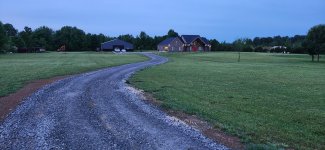/ [KUBOTA B3200] Grader Blade / Box Blade Recommendation for Driveway Maintenance
#41
Forest_Man
Bronze Member
If makes any impact: my B3200 has 4" spacers, adding 8" to total width and loaded rear tires.I'm gonna chime back in to STRONGLY recommend you stick with a 5' box blade for your B3200. 32 horsepower of engine can drag a 6' unit well in the right conditions, but your machine is very lightweight. Inertia is often what keeps a heavy pull moving through soil, not just rated power.
According to this, your machine is only 53" wide, so a 5' unit will cover your tracks well.
How about a blade? What length should I get? I just came across a 7 footer back blade for $350:
Yes, I understand the compromise and limitations. And the attachment originally is intended for driveway maintenance only - but you are correct, in the future we could use it on the forest.The general advice here on TBN is to buy the size box blade that covers your rear tire width by a couple inches, but don't go bigger. A 6' unit with the scarifiers down will easily stop your little B3200 dead in its tracks. A 5' probably will too, but a little less often, haha. The other factor is when driving through the forest, a 6' unit will bonk into trees more. Keep it tight.


